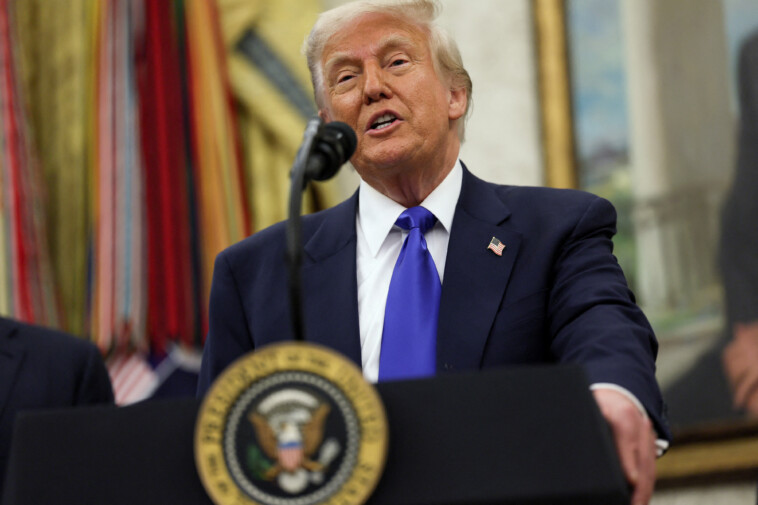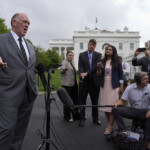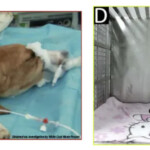WASHINGTON — President Trump will sign an executive order Monday to ban all federal funding of risky gain-of-function research in China, Iran and other countries without proper oversight of the experiments — more than five years after the start of the COVID-19 pandemic that US intel agencies have since said most likely resulted from a lab accident.
The order will yank funding from “any present and all future” gain-of-function research as well as deputize the National Institutes of Health (NIH) and other agencies to identify biological research harmful to public health or threatening to national security.
“These measures will drastically reduce the potential for lab-related incidents involving gain-of-function research, like that conducted on bat coronaviruses in China by the EcoHealth Alliance and Wuhan Institute of Virology,” according to a White House fact sheet reviewed by The Post.
The FBI, Energy Department and CIA — as well as former public health officials like onetime Centers for Disease Control and Prevention Director Dr. Robert Redfield — have all pointed to a lab leak as the most likely explanation for the outbreak that paralyzed the world in 2020.
Others, like former NIH Director Dr. Francis Collins and former National Institute of Allergy and Infectious Diseases Director Dr. Anthony Fauci, have maintained that natural spillover from animals to humans is the most plausible explanation.
White House officials also dinged the Biden administration for allowing the possibly global-pandemic producing experiments that enhance the infectiousness of viruses and bacteria.
Additionally, all research with infectious pathogens and toxins will be paused until the director of the Office of Science and Technology Policy and national security adviser develop a new policy with enforcement and reporting requirements.
Biden had signed a ban on gain-of-function research in China and other countries of concern into law in December 2022, though secretaries of Health and Human Services were able to override that restriction pending review and upon notifying Congress.
Federal agencies have also been unable to track where all of the funding ends up.
Since SARS-CoV-2 emerged and went on to kill more than 1 million Americans, federal officials, lawmakers and scientific experts have debated whether it was a result of US-funded gain-of-function research at the Wuhan Institute of Virology (WIV).
The NIAID, then run by Fauci, and the US Agency for International Development (USAID) funneled more than $1.4 million in grants and subawards through EcoHealth to the Chinese lab between 2014 and 2021 for a project titled “Understanding the Risk of Bat Coronavirus Emergence.”
That resulted in what ex-NIH principal deputy director Dr. Lawrence Tabak said were gain-of-function experiments at the WIV, though he and other officials have denied any direct link between the project and the COVID pandemic.
Another EcoHealth grant proposal known as Project DEFUSE, now seen as “smoking gun” evidence that COVID was engineered in a Chinese lab, was not included — despite being unclassified — in a final Office of Director of National Intelligence (ODNI) report on the virus’ origins released in August 2021.
Drafts and notes for Project DEFUSE previously obtained by US Right to Know revealed that EcoHealth president Dr. Peter Daszak sought to “downplay” the involvement of Wuhan researchers.
“I simply wanted to stress the US side of the proposal,” Daszak testified to Congress last year, before admitting Chinese biosafety regulations were less strict than those mandated in the US.
EcoHealth Alliance, a Manhattan-based nonprofit, submitted the proposal to the Defense Advanced Research Projects Agency (DARPA) in May 2018 and it was never funded — but Redfield has since suggested even unfunded projects can be tested under other research grants.
Daszak, in his hearing before the House Select Subcommittee on the Coronavirus Pandemic, also testified that he did not have access to all of the WIV’s genomic data and there may still be unpublished coronavirus samples at the lab.
A Defense Department whistleblower last year divulged that the details about DEFUSE weren’t used by ODNI to compile a US Intelligence Community assessment in August 2021 that claimed agencies were “divided” on the question of COVID origins.
FBI and Defense Department scientists also said they were “silenced” for compiling other evidence pointing to a lab leak that was left out of a critical briefing then-Director of National Intelligence Avril Haines delivered to then-President Joe Biden the same month.
Daszak and Fauci have long objected to claims that the COVID pandemic started from a laboratory accident or originated from gain-of-function experiments at the WIV — with the ex-White House COVID czar calling lab-leak proponents “conspiracy theorists.”
The Department of Defense Office of Inspector General last year also uncovered that the feds haven’t been able to track how much gain-of-function research — which involves the enhancement of what are known as possible pandemic pathogens — is being conducted in China or other nations.
The Pentagon’s internal watchdog cited “significant limitations with the adequacy of data” — and noted that such research is technically classified as “offensive biological work,” according to the 20-page report, and concluded the “full extent” of defense funding for it “is unknown.”
However, the inspector general’s review found at least seven grants of more than $15.5 million were found to have flowed through subrecipients to “contracting research organization[s] in China or other foreign countries for research related to potential enhancement of pathogens of pandemic potential.”
Of that, $46.7 million from 13 projects funded by the Defense Threat Reduction Agency (DTRA) was funneled to EcoHealth Alliance.
Roughly 12,660 grants were combed through in total, amounting to more than $1.4 billion in US taxpayer funding.
Defense officials said the experiments did not involve “strengthening” any viruses.
Sen. Joni Ernst (R-Iowa) forced the audit by tucking a provision into the 2024 National Defense Authorization Act.
“I have been fighting for years to end the insane practice of sending tax dollars to China for sketchy pseudoscience,” Ernst said. “Thankfully, President Trump is ending the batty experiments, like those conducted in Wuhan, that are dangerous and wasteful.
“This is a great win for the American people and common sense,” she added. “I will continue working to expose and halt all taxpayer-funded risky research of pandemic potential in malign foreign countries!”







